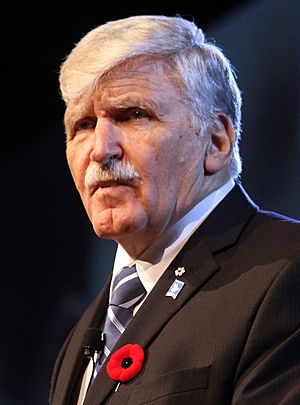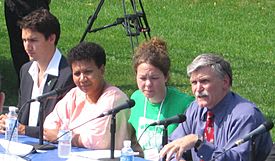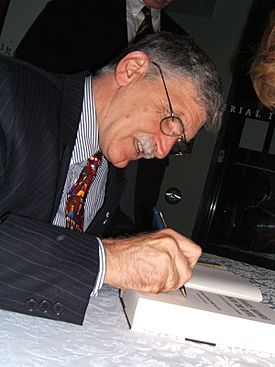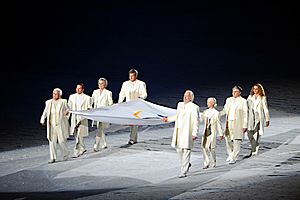Roméo Dallaire facts for kids
Quick facts for kids
Roméo Dallaire
|
|
|---|---|

Roméo Dallaire in 2017
|
|
| Canadian Senator from Quebec (Gulf) |
|
| In office March 25, 2005 – June 17, 2014 |
|
| Nominated by | Paul Martin |
| Appointed by | Adrienne Clarkson |
| Preceded by | Roch Bolduc |
| Succeeded by | Éric Forest |
| Personal details | |
| Born |
Roméo Antonius Dallaire
June 25, 1946 Denekamp, Netherlands |
| Political party | Independent (2014–present) |
| Other political affiliations |
Liberal (2005–2014) |
| Spouse |
Marie-Claude Michaud
(m. 2020)Elizabeth Roberge
(m. 1976; div. 2019) |
| Children | 3 (Willem, Catherine, Guy) |
| Alma mater | Royal Military College of Canada (BSc) |
| Military service | |
| Allegiance | Canada |
| Branch/service | |
| Years of service | 1963–2000 |
| Rank | Lieutenant-general |
| Commands |
|
| Awards | Officer of the Order of Canada Companion of the Order of Military Merit Grand Officer of the National Order of Quebec Meritorious Service Cross Canadian Forces' Decoration |
Roméo Antonius Dallaire (born June 25, 1946) is a retired Canadian military officer and politician. He served as a senator for Quebec from 2005 to 2014. Before that, he was a lieutenant-general in the Canadian Armed Forces. He is best known for leading the United Nations peacekeeping mission in Rwanda between 1993 and 1994. This was during the terrible time of the Rwandan genocide. Dallaire has also worked to raise awareness about human rights and the impact of conflict on children.
Contents
Roméo Dallaire's Early Life and Military Career
Roméo Antonius Dallaire was born in Denekamp, Netherlands. His father was a Canadian soldier, and his mother was a Dutch nurse. When he was six months old, he moved to Canada with his mother. They arrived in Halifax in December 1946. He grew up in Montreal.
Joining the Canadian Army
In 1963, Dallaire joined the Canadian Army. He started as a cadet at the Royal Military College Saint-Jean. In 1970, he finished his studies at the Royal Military College of Canada. He earned a science degree and became an officer in the Canadian Artillery.
In 1971, Dallaire found out he was not automatically a Canadian citizen. This was because he was born in the Netherlands, even though his father was Canadian. He later became a Canadian citizen. He also continued his military education at various colleges.
Leading Military Units
Dallaire commanded the 5th Light Artillery Regiment of Canada. In 1989, he was promoted to brigadier-general. He then led the 5th Canadian Mechanized Brigade Group. From 1990 to 1993, he was also the leader of the Collège militaire royal de Saint-Jean.
Roméo Dallaire's Mission in Rwanda
In late 1993, Dallaire was chosen to lead UNAMIR. This was the United Nations mission in Rwanda. Rwanda was in a civil war between the Hutu government and Tutsi rebels. UNAMIR's job was to help carry out a peace agreement called the Arusha Accords. This agreement aimed to give Tutsis some power in the Hutu government.
Challenges in Rwanda
The situation in Rwanda quickly became very dangerous. On April 6, 1994, the plane carrying Rwanda's president was shot down. Dallaire immediately sent soldiers to protect the prime minister, but she and her husband were killed. The next day, ten Belgian UN peacekeepers were also killed.
Dallaire faced an impossible situation. His small UN force was not well-equipped. They could not fight against the Rwandan military. He asked the UN Security Council for more soldiers and supplies. He believed 5,000 well-equipped troops could stop the killings. However, the Security Council refused his request. This was partly because the United States did not want to get involved after some of their soldiers died in Mogadishu, Somalia. Instead, the UN decided to reduce UNAMIR to only 270 troops.
As the Belgian troops left, Dallaire felt very let down. He had to watch his best-trained soldiers leave. He felt abandoned, even though his own father had fought to free Belgium many years before.
The Rwandan Genocide
After the Belgian forces left, Dallaire gathered his remaining soldiers. These were from Pakistani, Canadian, Ghanaian, Tunisian, and Bangladeshi forces. He focused on creating "safe areas" in and around Kigali. His main goal was to protect Tutsis who were hiding. Dallaire and his team, even the unarmed observers, used their UN status to save people. They often stopped attacks even when they were outnumbered. Dallaire and his staff are credited with saving the lives of about 32,000 people.
Dallaire praised the Tunisian and Ghanaian soldiers for their brave work. Ghana lost three peacekeepers during the mission.
End of the Genocide
As news of the killings spread, the UN Security Council changed its mind. They voted to send more peacekeepers, creating UNAMIR II with 5,500 troops.
The genocide lasted for 100 days. Between 800,000 and 1,171,000 Tutsi, Hutu moderates, and Twa people were killed. Over two million people had to leave their homes.
Difficult Decisions and Criticism
Dallaire faced criticism for his actions during the genocide. Some people questioned his decisions, especially regarding the deaths of the ten Belgian peacekeepers. He explained that he was in an extremely difficult situation. His forces were too small and not equipped to stop the violence. He wrote about these challenges in his book, Shake Hands with the Devil: The Failure of Humanity in Rwanda. In his book, he explained why he sent the ten soldiers to protect the Prime Minister during the terrible first hours of the genocide.
Roméo Dallaire's Life After Rwanda
After returning to Canada in 1994, Dallaire held several important military commands. He became Deputy Commander of Land Force Command and Commander of the 1st Canadian Division. Later, he commanded the Land Force Quebec Area.

In 1996, Dallaire was promoted to Chief of Staff at the Department of National Defence. He continued to work in human resources and officer development until 1999.
Dallaire has openly supported raising awareness for veterans' mental well-being. He has spoken about his own struggles and the importance of getting help.
In 2004, Dallaire testified at the International Criminal Tribunal for Rwanda. His testimony was important in the trial of Colonel Théoneste Bagosora, who was later found responsible for genocide.
Dallaire also worked as a special advisor to the Canadian Government. He focused on children affected by war and stopping the spread of small weapons. He worked with international groups on these issues, including child labor.
Senator and Advocate
On March 24, 2005, Prime Minister Paul Martin appointed Dallaire to the Canadian Senate. He represented the province of Quebec.
In 2007, Dallaire called for the reopening of Collège militaire royal de Saint-Jean. He wanted it to be a military college for French-speaking cadets.
Dallaire became a Senior Fellow at the Montreal Institute for Genocide and Human Rights Studies (MIGS) in 2006. He urged the international community to protect Bahá'ís in Iran from possible harm.
He has lectured at many universities in Canada and the United States. He researched conflict resolution and the use of child soldiers. He has written articles and chapters on these topics. His book, The Peace: A Warrior's Journey, explores his experiences.
Roméo Dallaire in Media
Dallaire's experiences in Rwanda have been featured in several documentaries and films.
Documentaries and Films
In 2002, the documentary The Last Just Man was released. It tells the story of the Rwandan genocide and includes interviews with Dallaire.
A documentary film called Shake Hands with the Devil: The Journey of Roméo Dallaire came out in 2004. It was inspired by his book and shows his return to Rwanda ten years later. The film won an Audience Award at the Sundance Film Festival.
In 2004, the PBS documentary The Ghosts of Rwanda featured Dallaire. He said in an interview, "Rwanda will never ever leave me. It's in the pores of my body. My soul is in those hills..."
The 2004 film Hotel Rwanda included a character based on Dallaire, played by Nick Nolte. Dallaire said he was not consulted for this film.
A Canadian dramatic film, Shake Hands with the Devil, was made in 2006. It was based on Dallaire's book, and he was consulted for it. Roy Dupuis played Dallaire in the film. It won an Emmy award for Outstanding Documentary.
Awards and Recognition for Roméo Dallaire
Dallaire has received many awards for his service and his work.
In 1996, he was given the Officer of the Legion of Merit of the United States. This is a high military award for foreigners. In 2002, he received the first Aegis Trust Award. On October 10, 2002, he became an Officer in the Order of Canada.
In 2005, he was awarded the 25th Pearson Peace Medal. In 2006, he received the Human Security Award from the University of California, Irvine.
Dallaire has also received many honorary doctorates from universities in Canada and the United States. These include degrees from the University of Saskatchewan, Boston College, and Harvard University. He was also named an Honorary Fellow of the Royal College of Physicians and Surgeons of Canada.
His book, Shake Hands with the Devil: The Failure of Humanity in Rwanda, won the Governor General's Literary Award for Non-Fiction in 2004.
In 2007, Dallaire planted a tree at the Kofi Annan International Peacekeeping Training Centre in Ghana. He also accepted Sir Joseph Rotblat's Nobel Peace Prize as part of the 50th Anniversary of the Pugwash Peace Exchange.
Several elementary schools are named after Dallaire in Canada. There is also a street named after him in Calgary, Alberta.
Dallaire was one of the eight people who carried the Olympic Flag at the opening ceremony for the 2010 Olympic Winter Games in Vancouver.
Images for kids
See also
 In Spanish: Roméo Dallaire para niños
In Spanish: Roméo Dallaire para niños
 | James B. Knighten |
 | Azellia White |
 | Willa Brown |







